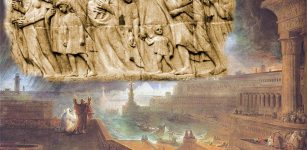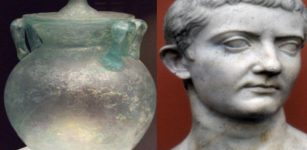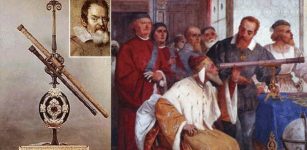House Of Plantagenet – How Hatred, Revenge And Jealousy Transformed History
David Tee - AncientPages.com - The one family that has put more kings on the throne of England were not natural English citizens. The family descended from the Frankish family the Ingelger. Yet, royal lineage can be a long and winding road.
How the Plantagenet became one of the longest-reigning families in England started with Geoffrey who married Henry I’s daughter. This marriage united three royal families, the Angevin, the House of Normandy, and finally the House of Wessex.
Left: Henry II (1154-1189) is considered by some to be the first Plantagenet king of England. Middle: Parchment miniature of Henry V's victory at the Battle of Agincourt in 1415, from Enguerrand de Monstrelet's Chronique de France circa 1495. Right: Artistic impression of King Richard Lionheart. All images public domain.
British law does allow the royal family to choose their own surname which is why this united family ended up being called the Plantagenet. From this not-so-humble beginning, started a 300-year reign filled with treachery, intrigue, deception, and much more.
Empress Matilda Takes England By Force
Henry I originally named his only daughter Matilda (1102 – 1167) as heir to his English and French holdings. Yet, it was right after Henry I’s death, that Matilda’s cousin Stephen made his move and had himself declared the next King.
This act prompted Matilda to return to England to wage war with her cousin. Her husband Geoffrey was working to get her French inheritance back, but Matilda preferred England.
In the War of Anarchy, Matilda captured Stephen in order to trade him for her half-brother. After the trade was done, Stephen was re-crowned as King, although this did not stop the war from continuing. Geoffrey was successful in reacquiring the Duchess of Normandy for his wife.
Richard The Lionheart Becomes King
Matilda’s son, through little negotiations of his own, was made the heir to Stephen, and once on the throne, he was not free from any intrigue himself. When Henry II tried to give his youngest son some land, his own wife and three older sons rebelled at the idea. This rebellion led to the Revolt of 1173–1174.
With help from Louis VI, the rebels were able to fight a losing battle with Henry II for a year and a half. Unfortunately for Henry II, two of his older sons died and Richard, the second eldest worked with Philip II to force his father to name him a sole heir.
This Richard was known later as Richard the Lionheart, the King who led the Third Crusade. He was the son of Eleanor Of Aquitaine, one of the most powerful women of the Middle Ages. It seems he was not as nice as some historians have led everyone to believe. Richard the Lionheart ascended the throne on July 6, 1189. On Richard’s coronation day, Jews were slaughtered. Then later he deposed the King of Cyprus, sold the island among other dirty deeds.
English Richard The Lionheart on his way to Jerusalem. Credit: Public Domain
Richard was eventually captured and held for ransom. During this time John ascended to the throne and his rule sparked the writing of the Magna Carta. But Richard was not finished. The ransom was paid, and Richard returned to the throne.
He did not stay on the throne very long as he was seeking revenge on Phillip II for stealing his French land. Richard never returned to England as he was killed by an arrow at the battle of Château de Châlus-Chabrol.
The Wars Of The Roses And Execution Of Henry VI
There is so much intrigue, treachery, and double-dealing in the House of Plantagenet throughout their dynasty, that it is impossible to cover it all. It was around 400 AD that the House of Plantagenet split into two separate royal houses. Both Houses sought to ascend to be King.
This conflict is what led to the Wars of the Roses. It was given this name simply because both houses used the rose as their family symbol White was for the Yorks and Red for the Lancasters.
It was at this time that Ann Neville’s father became known as the kingmaker. His work led to several people being placed on the throne. The war started when Richard VI was declared insane. Richard, the Duke of York ruled in his place holding the support of the elder Neville.
Wars of Roses. Image credit: AncientPages.com
A good turn of events for Henry VI helped him regain his throne the Duke of York liked the power that came with being king and raised an army to retake the throne. The Duke of York was killed but his son beat Richard VI to London and had himself declared king.
For ten years Edward ruled England, but Neville had not given up on restoring the throne to Henry VI. He made an alliance with his former enemies and let the York infighting undermine Edward IV’s authority.
The new alliance was successful and returned Henry VI to the throne. But this triumph was short-lived as Edward IV returned from exile in Holland to defeat his enemies at the Battle of Barnett and Tewkesbury. Henry VI was locked up in the Tower of London where he was finally executed.
King Richard III Killed By Henry Tudor’s Troops
After Edward IV died, his brother deposed his nephew and took the throne for himself. This treachery did not save Richard III from intrigue that ripped the throne from his hands. He was killed by French and York troops led by Henry Tudor at the Battle of Bosworth.
Henry then married Elizabeth, the daughter of Edward IV. This marriage united the Houses of York, Lancaster, and the Tudors. The Tudors ruled England for roughly the next 118 years.
Some Final Thoughts
As you can see by this brief look at the House of Plantagenet, power, wealth and control does strange things to people. It divides close families and renders them unable to maintain that power and control they desired so much.
From the beginning, the House of Plantagenet did not really stand a chance of lasting long as rulers. They were too divided by personal interests to remain effective. Even though they ruled for about 300 years, the legacy they left behind was greed, theft, intrigue, treachery, and even murder.
Richard the Lionheart did nothing to change that legacy even though history treats him rather well in most cases. As Abraham Lincoln said, a house divided cannot stand. That was the House of Plantagenet. It was divided, and it did not stand.
Written by – David Tee - AncientPages.com
Copyright © AncientPages.com All rights reserved. This material may not be published, broadcast, rewritten or redistributed in whole or part without the express written permission of AncientPages.com
Expand for referencesMore From Ancient Pages
-
 Inscription Found In Ancient Thracian Tomb in Bulgaria’s Tatarevo Is A Verse from Solon’s ‘Prayer to the Muses’
News | Sep 29, 2015
Inscription Found In Ancient Thracian Tomb in Bulgaria’s Tatarevo Is A Verse from Solon’s ‘Prayer to the Muses’
News | Sep 29, 2015 -
 Did The Amazons Really Exist? – Truth Behind Myths Of Fierce Female Warriors
Featured Stories | Oct 29, 2014
Did The Amazons Really Exist? – Truth Behind Myths Of Fierce Female Warriors
Featured Stories | Oct 29, 2014 -
 Isle Of May Was A Pictish Healing Center – Monks Used Herbs To Treat Sick And Dying People
Archaeology | Feb 16, 2018
Isle Of May Was A Pictish Healing Center – Monks Used Herbs To Treat Sick And Dying People
Archaeology | Feb 16, 2018 -
 Ancient Secrets Of Mankind And The Anunnaki Revealed On The 14 Tablets of Enki
News | Jun 18, 2014
Ancient Secrets Of Mankind And The Anunnaki Revealed On The 14 Tablets of Enki
News | Jun 18, 2014 -
 Golden Secrets Of Lake Guatavita And The Muisca People Gave Rise To The El Dorado Myth
Featured Stories | Nov 12, 2019
Golden Secrets Of Lake Guatavita And The Muisca People Gave Rise To The El Dorado Myth
Featured Stories | Nov 12, 2019 -
 On This Day In History: First Battle Of Reading Took Place – On Jan 4, 871 AD
News | Jan 4, 2017
On This Day In History: First Battle Of Reading Took Place – On Jan 4, 871 AD
News | Jan 4, 2017 -
 Native American Legend Of Apotamkin Teaches Children Obedience
Featured Stories | May 14, 2019
Native American Legend Of Apotamkin Teaches Children Obedience
Featured Stories | May 14, 2019 -
 Ensisheim Meteorite Is The Oldest Meteorite With A Precise Date Of Impact
Ancient History Facts | Jun 29, 2018
Ensisheim Meteorite Is The Oldest Meteorite With A Precise Date Of Impact
Ancient History Facts | Jun 29, 2018 -
 Is Ipuwer Papyrus A Report Of An Ancient Catastrophe?
Artifacts | Aug 7, 2017
Is Ipuwer Papyrus A Report Of An Ancient Catastrophe?
Artifacts | Aug 7, 2017 -
 Why Were American Soldiers Called Yankees And Where Does Yankee Doodle Come From?
Ancient History Facts | Sep 12, 2019
Why Were American Soldiers Called Yankees And Where Does Yankee Doodle Come From?
Ancient History Facts | Sep 12, 2019 -
 Huge Maya Stucco Mask Unearthed At Ucanha Site In Yucatan
Archaeology | Feb 19, 2021
Huge Maya Stucco Mask Unearthed At Ucanha Site In Yucatan
Archaeology | Feb 19, 2021 -
 Did A Comet Explosion Over North America Lead To Downfall Of Ancient Hopewell Culture?
Archaeology | Feb 2, 2022
Did A Comet Explosion Over North America Lead To Downfall Of Ancient Hopewell Culture?
Archaeology | Feb 2, 2022 -
 Remarkable 5,000-Year-Old Crystal Dagger Discovered In Megalithic Tomb Of Montelirio Tholos
Archaeology | Feb 13, 2021
Remarkable 5,000-Year-Old Crystal Dagger Discovered In Megalithic Tomb Of Montelirio Tholos
Archaeology | Feb 13, 2021 -
 Sacred Helgafell Mountain And The Story Of Torolv Mostrarskjegg
Featured Stories | Mar 13, 2024
Sacred Helgafell Mountain And The Story Of Torolv Mostrarskjegg
Featured Stories | Mar 13, 2024 -
 Impressive Marble Statue Of A Ram, An Ancient Christian Symbol For Jesus Discovered
Ancient Symbols | Dec 28, 2015
Impressive Marble Statue Of A Ram, An Ancient Christian Symbol For Jesus Discovered
Ancient Symbols | Dec 28, 2015 -
 Enigma Of Mount Ararat – Researchers Are Determined To Reveal The Truth To The World
Featured Stories | Jun 27, 2014
Enigma Of Mount Ararat – Researchers Are Determined To Reveal The Truth To The World
Featured Stories | Jun 27, 2014 -
 Flexible Glass – Lost Ancient Roman Invention Because Glassmaker Was Beheaded By Emperor Tiberius
Ancient Technology | Jul 27, 2023
Flexible Glass – Lost Ancient Roman Invention Because Glassmaker Was Beheaded By Emperor Tiberius
Ancient Technology | Jul 27, 2023 -
 Astonishing Pre-Inca Salt Ponds of Maras In Peru Were Created By The Chanapata Culture
Civilizations | Sep 14, 2016
Astonishing Pre-Inca Salt Ponds of Maras In Peru Were Created By The Chanapata Culture
Civilizations | Sep 14, 2016 -
 On This Day In History: Galilei Galileo Demonstrates His First Telescope – August 25, 1609
News | Aug 25, 2016
On This Day In History: Galilei Galileo Demonstrates His First Telescope – August 25, 1609
News | Aug 25, 2016 -
 Startling Discovery Of Nubian Levallois Technology In Shukbah Cave Re-Writes Ancient History Of Neanderthals And Homo Sapiens
Archaeology | Feb 24, 2021
Startling Discovery Of Nubian Levallois Technology In Shukbah Cave Re-Writes Ancient History Of Neanderthals And Homo Sapiens
Archaeology | Feb 24, 2021



